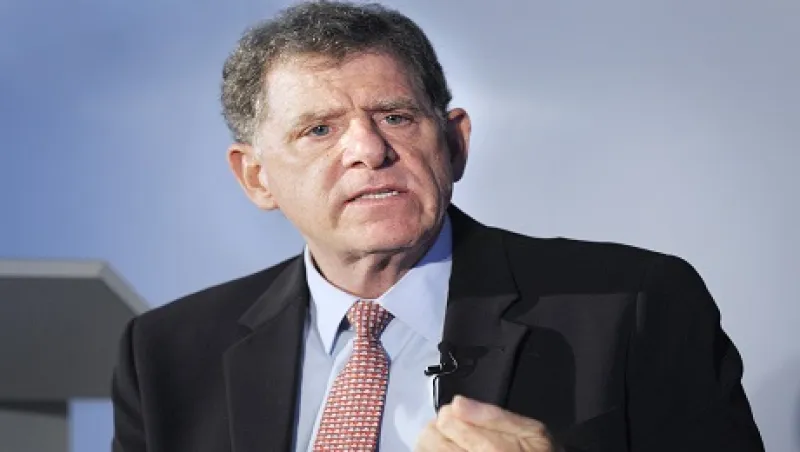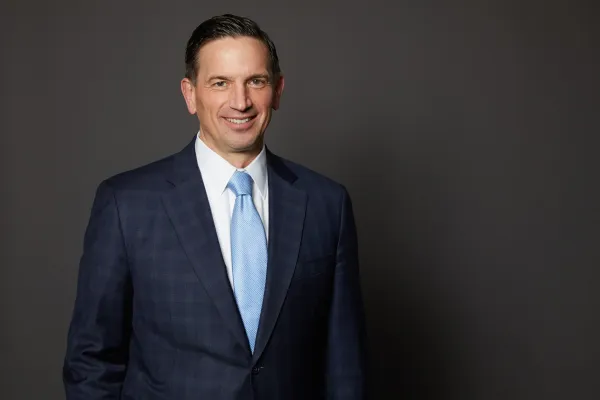When Martin Cohen thinks he has a good idea, he’s willing to burrow in and wait.
It took about seven years before he and his good friend Robert Steers, co-founder in 1986 of Cohen & Steers, got a taste of success in the fledgling world of managing real estate investment trusts, a security originally created to provide mainstream investors with access to the tony world of real estate. Today the firm’s name is shorthand for REITs. Now the 64-year-old Cohen is keen on the concept of real assets, especially how real estate, natural resources and commodities can protect investors against inflation — which Cohen believes is a "when" not an "if."
In his midtown New York office — dotted with custom-made bronze statues from real estate mogul Sam Zell, who famously sends out almost 700 of the tchotchkes each year — Cohen tells Senior Writer Julie Segal about competing in the tough world of active management, his firm’s longtime battle to attract institutional investors to REITs, and his view on the role that real assets can play in protecting purchasing power from inflation.
Institutional Investor: Active managers are getting hit as investors increasingly sock money away into passive funds. How do you compete?
Cohen: We’ve tried to offer things that are timely and cannot easily be duplicated by, say, an exchange-traded fund. The preferred stock strategy is an example. Preferreds are very complex securities. You can’t do this yourself. You can get burned if you haven’t read the covenants; if companies get taken over and suddenly you have an orphan security; or if things get called on you. You need professional management. There are a couple of ETFs out there for people who say, “I give up; I don’t want to figure this out.” But the ETFs own securities [can] get called, [and] active managers know how to pick them off. The ETF doesn’t work with preferreds; you get decent returns but nothing near what an active manager can do.
Eighty percent of institutional investors’ real estate allocation is still in private funds rather than publicly traded REITs, even though REITs outperform. Have you given up that fight?
I fight that fight every day. After many years in this business, there are so many things I don’t understand. I can’t explain why people buy private REITs as opposed to public REITs or why institutions are buying bonds today where they have nothing but downside. Pension funds that hold intermediate and long-term bonds will never meet their liabilities by investing in that [way]. I’ve asked them, "Why do you own this? It’s never going to work." But they don’t have a good explanation, except they see volatility. Eventually rates will go up; they’ll see their valuations slide; they’ll get questioned.
The money managers that have done very well the past few years have had bond funds to sell. Have you ever thought about launching fixed income?
We’ve been very careful to not get sucked into fixed income, except with preferreds, which have unique characteristics. We’ve looked at fixed income, but we couldn’t make a case for it. The fees are very low and you need a lot of scale to make it work. What do we have that a BlackRock or a Pimco doesn’t have?
The market has changed. There is more competition, but there is also the technical side of the market. Dislocations are routine and you have to understand how to take advantage of those dislocations. If the Dow Jones Industrial Average is down 200 points, was that a technical move or a fundamental move? Investing involves more than just doing your homework on a particular stock; there’s more noise taking place on a moment-to-moment basis. You have to figure out how to take advantage of that.
The world has also changed post–financial crisis. You need to adapt to that, whether it’s to a zero interest rate environment or a new world of trading. There’s no chapter in the economics book on how to deal with zero interest rates. That’s being written now.
After three decades in the investment world, what’s capturing your attention now?
I’m really hung up on the bond bubble. Maybe I’ll be wrong. In the television series Homeland, the lead character is a CIA agent who thinks she has uncovered a rat. She says, “I’ve never been so sure of something and so wrong.” That’s how I feel about this bond bubble: I’ve never been so sure about something and, so far, so wrong. Eventually, the Homeland agent was proved right.
As we pile on more and more debt and there is more stimulus, that will ultimately affect the prices of assets. Maybe we’re starting to see that shift somewhat already, where there’s so much liquidity that the liquidity will seek higher returns, whether in real estate, commodities or stocks. The result of that stimulus will also tie into a stronger economy worldwide, even if so far it’s been very hard to get the whole world in sync. But eventually, with enough stimulus, that will happen. At that point you’ll start to see inflation, and in a higher inflation environment investors won’t be satisfied with negative real interest rates. Then you’ll see a lot of pressure on bond prices.
Investors increasingly want instant results. How have you and Bob had the patience to build this business through multiple market cycles and booms and busts?
It’s very cool in retrospect. We never had designs on being a $50 billion organization. It was just doing what we felt very strongly about, a value-added business where we had expertise that was unique and we grew it one step at a time. My kids want instant gratification just as investors want to buy a stock and have it go up immediately. Sometimes that works out but, frankly, slow and steady really does win the race.







